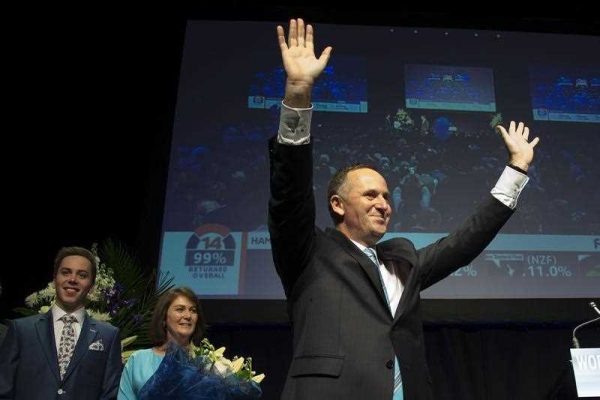While there was little explicit attention to regional affairs in the election campaign, they were not far below the surface. Much of the media attention was focused on allegations of ‘dirty tricks’ by politicians and forthcoming revelations of illegal surveillance by security agencies. The former resulted only in evidence that some politicians now use modern social media in much the same way that some earlier politicians misused print media. The latter showed that there cannot be sensible public debate about security issues conducted by a media which sees itself as making the news through sensationalist sound bites rather than reporting significant information. The campaign generated no new information at all.
The election debate therefore never approached the question of how New Zealand’s participation in the ‘Five Eyes’ arrangement fits with New Zealand’s place in the contemporary world. The Five Eyes arrangement links the security services of New Zealand with Australia, Canada, the United Kingdom and the United States. Like the structure of the UN Security Council, or the distribution of votes in the governance of the World Bank and IMF, the arrangement originated in the era of the Second World War and there needs to be continued evaluation of how it fits changed circumstances. But that requires serious study of the costs and benefits of the present arrangement and feasible alternatives, not electioneering rhetoric. The appropriate balance between maintaining traditional friendships and adapting to a changed world will be one of the major issues facing the New Zealand government, and it starts without any electoral guidance.
The nature of New Zealand’s participation in the international or regional economy was not addressed honestly. Regional issues surfaced only in the context of opposition to overseas investment in New Zealand land. Currently, such opposition does not consider whether Chinese investment differs from foreign investment from other sources. Nor does it consider how New Zealand can benefit from economic integration if cross-border investment flows are regarded with suspicion — when it is obvious that New Zealand firms need to invest overseas to participate in regional and global opportunities. Open opposition to participation in the Trans-Pacific Partnership and other integration processes was mostly limited to questioning specific provisions, despite these provisions not yet being determined let alone known. But a wider change was never far beneath the surface.
The trade debate is in large part a proxy for the debate about open market economies that is at the core of the problems of the opposition Labour and Green parties.
The election result was a disappointment for Opposition parties. New Zealand First, which is little more than a vehicle for the populist career of Winston Peters, did not find itself in a kingmaker’s role and as Peters ages, the party’s future is uncertain. The Green Party ended with about the same proportion of the vote as in 2011, not the gain it expected to take it into office as a significant coalition partner. It now faces another three years in opposition and a good deal of reflection as it faces claims that environmentalism would be better served without the belief that it is indissolubly linked to left-wing causes. All previous efforts to separate the two have failed and the prospects for any quick change are dim.
But the big loser was the Labour Party. Its share of the vote was just 25 per cent. (The National Party got 48 per cent). The Labour Party had changed its leader to David Cunliffe, who was thought more likely to attract support than his predecessor David Shearer. But instead the Labour Party suffered its worst result since 1922. It is now engaged in a bitter leadership battle. Shearer suggested that Cunliffe should leave parliament, but he has only withdrawn from the leadership race because ‘at this time’ somebody else might better unify caucus. That is an understatement.
In any case, the problem for the Labour Party is not the personality of the leader but the inability of the party to focus on the future while it continues to battle over its past. It is deeply torn over whether or not the economic achievements of the Labour Government of the 1980s should be entirely disowned. Does it embrace the internationalist economic stance adopted in the 1980s or does it wish to return to a protectionist, insulated economy? The depth of disagreement means that the future existence of the Labour Party is not assured.
For the foreseeable future, New Zealand’s participation in regional affairs will be characterised by continuity. In the longer term, it depends on resolution — or at least evolution — of domestic debates about fundamental economic strategy.
Gary Hawke is an Associate Senior Fellow at the New Zealand Institute of Economic Research, and a member of the Academic Advisory Council of the Economic Research Institute for ASEAN and East Asia.

